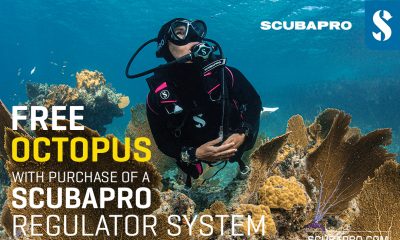Marine Life & Conservation
British beaches are the final resting places for mountains of litter with more arriving on every wave and gust of wind, says the MCS

What do half a TV, a French bullet-proof vest and an unopened pack of bacon have in common?
They were all cleared from UK beaches during a single weekend last September and were among the 223,405 bits of litter that volunteers bagged up and removed as part of the Beachwatch Big Weekend 2013, organised by the Marine Conservation Society.
The UK’s leading beach cleanup and survey has now been running for twenty years and over the two decades the amount of litter found on our beaches has been steadily increasing. The 20th anniversary clean up, which took place between 20th and 23rd September 2013, saw 2,309 items of litter found on every kilometre cleaned – the highest in Beachwatch history.
MCS says that in 20 years 59,493 volunteers have taken part in Beachwatch Big Weekend, removing 5,528,399 pieces of litter from 3,080.5km of coastline.
“This is a disgusting tide of litter which is threatening the safety of beach visitors both human and animal. It’s coming in from the sea, being blown from the land or simply being dumped and dropped. After 20 years of campaigning it’s disheartening that in 2013 we are seeing worse litter levels than ever,” says Lauren Eyles, MCS Beachwatch Officer.
MCS Beachwatch volunteers record where the litter they find comes from to help the charity campaign to stop it getting there in the first place.
Here’s where the litter recorded last September came from:
Public – 39.4% This is all the stuff littered by people – it’s dropped intentionally, left behind accidentally, or it arrives on the beach carried on the wind or in rivers.
Fishing – 12.6% Includes commercial and recreational fishing stuff – line, nets, weights, floats.
Shipping – 4.5% This is all the stuff that gets dropped, lost or thrown overboard from small craft to massive cargo ships.
Sewage Related Debris (SRD) – 4.3% The really nasty stuff – bits people put down the loo but shouldn’t – cotton bud sticks, tampons, nappies and the like.
Fly-tipped 0.9% People use some beaches like the local tip – fly-tipping things like furniture, pottery and ceramics.
Medical – 0.2% Inhalers, plasters, syringes – stuff you really don’t want your kids picking up.
Non-sourced – 38.1% All the bits and bobs that can’t really be identified – generally small things or damaged stuff.
Lauren Eyles says 2013 was a vintage year for finding strange things on beaches: “As well as half a TV, a French bullet-proof vest and a pack of bacon, there was a brass candlestick, some plastic bird feet, a birdcage, a bath plug, half a canoe and a set of dentures!” Top of the finds was once again plastic pieces. These are tiny bits of plastic that have broken off larger items or have been in the sea for possibly decades and become smaller and smaller.
“Plastic is a real issue for our oceans and beaches,” says Lauren Eyles. “This year we also picked up lots of lids and caps. However, despite it being a really warm summer, we saw less crisp, sweets and lolly wrappers and fewer plastic bottles. There’s continued good news though for Sewage Related Debris (SRD) – there’s still less of it about after we asked people, in 2011, to stop flushing things down the loo that should go in the bin.”
Regionally, beaches in the North West of England had almost double the amount of litter per kilometre than the national average at over 4,000 pieces, whilst the South West, which normally has high litter levels, had well below the national average at just over 1,750 pieces per kilometre. Litter on Welsh beaches increased by 60% between 2012 and 2013 with almost 4,500 bits of rubbish per kilometre.
MCS says urgent steps must be taken to reverse the rising tide of beach litter. During June it will be launching its Marine Litter Action Network which will be tasked with changing behaviour in a variety of areas from the plastics industry to manufacturing, retail to shipping.
“Marine Litter Action Network meetings and workshops will take place between June 2014 and June 2015. Experts from the areas that we believe can do more will be joining us to identify ways that everyone can help reduce marine litter. This is no talking shop – we will have a year to make a difference and will be presenting the Government with our plans which we will be asking them to implement as part of the Marine Strategy Framework Directive which gives the Government certain objectives it has to meet,” says Lauren Eyles.
MCS will be running beach cleans and surveys around the UK coast this Spring and Autumn, and the charity is calling on the public to take part and make this the biggest year of beach cleans and surveys ever. The first big event will take place at hundreds of beaches between 24th and 30th April. You can find out more and register at www.mcsuk.org/foreverfish.
Marine Life & Conservation
Steve Backshall to headline Shark Trust’s flagship event: For the Love of Sharks

Join a host of amazing, shark loving, speakers including Steve Backshall and the Shark Trust team for an evening celebrating shark conservation at the Royal Geographical Society in London this November.
Date: 29th November 2024
Time: 6-10pm
Location: Royal Geographical Society, London
Tickets: https://www.sharktrust.org/Event/flos24
The event will be a celebration of all things shark. Those lucky enough to get hold of tickets will hear from engaging guest speakers with a passion for sharks.
The line-up includes (*subject to change if unforeseen circumstances arise)
Steve Backshall: One of television’s busiest presenters, BAFTA award-winning wildlife expert Steve has been passionate about the wild world ever since he was young.
Steve’s impressive TV career has taken him all around the world, investigating a wide array of species and environments. Steve has filmed over 100 hours of children’s wildlife programmes with the BAFTA award winning Deadly 60 franchise and recently, with Sky Nature, for his new series ‘Whale with Steve Backshall’. He has been a patron for the Shark Trust for 10 years.
Simon Rogerson: is a photojournalist specialising in natural history, diving and the sea.
He is editor of SCUBA magazine, the official journal of the British Sub-Aqua Club. Simon started his career as a crime reporter but gravitated towards his ‘less depressing’ interest in underwater exploration, joining the staff of DIVE magazine in 1999. In 2005 he was named ‘Editor of the Year’ in the PPA’s Independent Publishing Awards. Simon also works as a freelance writer, contributing frequently to the Sunday Times and Telegraph, in addition to BBC Wildlife, Esquire, and a host of international diving magazines. He is the author of a book, Dive Red Sea, published by Ultimate Sports. Now based in Berkshire, Simon has been a Patron of the Shark Trust for 20 years.
More speakers to be announced soon. Head to the Shark Trust website to learn more.
The evening will also allow guests the final chance to see the Oceanic 31, shark art exhibition. Some of the artwork will be auctioned/raffled at the event, while the rest will be auctioned online to raise money for the Shark Trust Oceanic Programme.
For the Love of Sharks is an evening with something for everyone who is interested and fascinated by sharks. Join the Shark Trust, their Patrons, Trustees and Staff, along with a host of supporters for this celebration of shark conservation.
For more information or to buy a ticket: https://www.sharktrust.org/Event/flos24
Marine Life & Conservation
Double Bubble for Basking Sharks

 The Shark Trust is excited to announce that, for two more days only, all donations, large or small, will be doubled in the Big Give Green Match Fund!
The Shark Trust is excited to announce that, for two more days only, all donations, large or small, will be doubled in the Big Give Green Match Fund!
Donate to Basking in Nature: Sighting Giants
The Shark Trust is hoping to raise £10k which will be doubled to £20k. This will go towards Basking in Nature: Sighting Giants. And they need YOUR help to reach they’re goal.
The Shark Trust’s citizen science project is to monitor and assess basking sharks through sightings; encouraging data collection, community engagement, and promoting nature accessibility. This initiative aims to enhance health and wellbeing by fostering a deeper connection with British Sharks.
Campaign Aims
- Increase citizen science reporting of Basking Sharks and other shark sightings to help inform shark and ray conservation.
- Provide educational talks about the diverse range of sharks and rays in British waters and accessible identification guides!
- Create engaging and fun information panels on how to ID the amazing sharks and rays we have on our doorstep! These can be used on coastal paths around the Southwest. With activities and information on how you can make a difference for sharks and rays!
- Promote mental wellbeing through increasing time in nature and discovering the wonders beneath the waves!
Donate, and double your impact. Click Here
-

 News3 months ago
News3 months agoHone your underwater photography skills with Alphamarine Photography at Red Sea Diving Safari in March
-

 News3 months ago
News3 months agoCapturing Critters in Lembeh Underwater Photography Workshop 2024: Event Roundup
-

 Marine Life & Conservation Blogs3 months ago
Marine Life & Conservation Blogs3 months agoCreature Feature: Swell Sharks
-

 Blogs2 months ago
Blogs2 months agoMurex Resorts: Passport to Paradise!
-

 Blogs2 months ago
Blogs2 months agoDiver Discovering Whale Skeletons Beneath Ice Judged World’s Best Underwater Photograph
-

 Gear Reviews3 weeks ago
Gear Reviews3 weeks agoGEAR REVIEW – Revolutionising Diving Comfort: The Sharkskin T2 Chillproof Suit
-

 Gear Reviews3 months ago
Gear Reviews3 months agoGear Review: Oceanic+ Dive Housing for iPhone
-

 Marine Life & Conservation2 months ago
Marine Life & Conservation2 months agoSave the Manatee Club launches brand new webcams at Silver Springs State Park, Florida


















